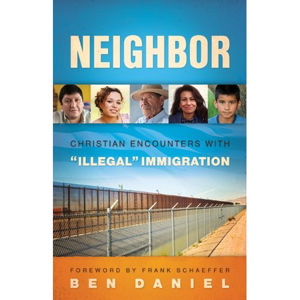 This month, Westminster John Knox is pleased to publish the new book Neighbor: Christian Encounters with “Illegal” Immigration. Author Ben Daniel sits down with Flunking Sainthood to discuss his book, the role of immigration in the Bible, and the new anti-immigration measures that recently took effect in Arizona.
This month, Westminster John Knox is pleased to publish the new book Neighbor: Christian Encounters with “Illegal” Immigration. Author Ben Daniel sits down with Flunking Sainthood to discuss his book, the role of immigration in the Bible, and the new anti-immigration measures that recently took effect in Arizona.
Ben, why did you decide to write a book for Christians about immigration? What drew you to this topic?
In many ways, this book is a tribute to my neighborhood, which is a predominantly Hispanic, mostly immigrant community in San Jose, California. It is a great place to live. The people are friendly, most of the businesses have survived the recession, there’s a great sense of place, there is a lot of artistic expression, and the food is terrific. My biracial, tri-national family has felt welcomed. I’m happy to be raising my kids here.
When I hear people expressing fears around immigration, often I find that people are afraid that the rest of America will look something like my neighborhood–culturally more like Mexico and Central America than northern Europe or New England. I wanted to write a book that would help American Christians understand that if the future of America looks like east San Jose, then we have nothing to fear.
As it turned out, the book ended up being about much more than my neighborhood (in fact I think I only mention my neighborhood in a few places), but that was my starting point.
What do you want to convey by the title Neighbor?

In the parable of the Good Samaritan, Jesus teaches his disciples that the neighbor–the person who blesses us and enriches our lives–is the Samaritan, an object of prejudice and scorn among Jesus’ followers. For many Americans today, undocumented migrants are like the Samaritans of Jesus’ time; I believe God calls us to think of undocumented migrants not with scorn, but with kindness, hospitality, and even gratitude. With the title I wanted to convey the spiritual truth that those we call “illegal immigrants” should be treated as God calls us to treat our neighbors. In my case, some of my physical neighbors are undocumented immigrants, but for all of us, in a spiritual sense, undocumented immigrants are the people who can bless and enrich us. Our lives interact with undocumented migrants every day; they harvest most of our food, more often than not they tend our gardens, bus our tables, and work all sorts of jobs that make the lives of middle-class Americans easier and cheaper.
You make the controversial assertion in the book that immigrants are not a drain on our nation’s economy; in fact, they contribute more to the bottom line than they take away. Can you explain that in more detail?
Undocumented immigrants contribute to our economy in several ways. To begin with, without undocumented labor our food would be a lot more expensive because something like 70% of American agricultural workers are undocumented laborers, working at or below minimum wage. Thanks to undocumented labor, Americans pay less for food, per capita, than anyone else in the developed world. If those workers were deported, it would cause a food crisis in America, and the cost of eating would skyrocket.
Also, many undocumented workers find employment using false or stolen social security numbers. Employers then deduct payroll taxes from the undocumented persons’ paychecks, which means that the federal government garners income tax and social security withholdings from these workers. According to the New York Times, undocumented workers paid something like seven billion dollars into the social security program. They will never collect this money; instead, it will subsidize the retirement earnings of citizens and legal immigrants.
Finally, undocumented immigrants spend money in America. They patronize businesses, supporting local economies, and, in most states, the purchases they make also generate sales tax. Without undocumented immigrants, the economies of many neighborhoods throughout the United States would dry up; losing undocumented immigrants’ sales tax would pound the final nail into the economic coffin of California and maybe other states as well.
What does the Bible have to say about immigration?
A lot. In fact, I would say that immigration is one of the Bible’s unifying themes. In the Bible, the people of God almost always are on the move, and, in the Bible, God always is on the side of the immigrant over and against local, established populations. This is true from the time that God accepts the sacrifice of Abel, the nomadic herdsman, and rejects the sacrifice of Cain, the settled farmer and builder of cities, until the day when all of the human family lives together as immigrants in the New Jerusalem.
I know your book is primarily about people, not policies, but what do you think about the Arizona immigration law that just took effect?
Arizona’s law is based upon fears and not facts. Supporters of SB 1070 are quick to say that the statute was passed as a way of addressing skyrocketing crime in Arizona and around the country, but in Arizona as in the rest of the United States, over the last fifteen years, crime has gone down as immigration has risen.
Proponents of Arizona’s law say that something had to be done by the states because the federal government hadn’t been doing its job, yet today there are more border patrol agents along the border than ever before. The fence along America’s southwest flank is now seven hundred miles long. It stretches from San Diego to El Paso through extremely rough terrain. The border never has been more secure.
The simple and uncomfortable truth is that Arizona’s lawmakers passed SB 1070 without availing themselves of the best information available to them, and that is a shame.
Why do you think that many people are so afraid of immigrants today, especially considering America’s history as a nation of immigrants?
We are a nation of immigrants with a history of anti-immigrant bigotry. It’s a paradox. The disquieting reality is that Americans who are descended from immigrants always have been afraid of immigrants, especially non-white and non-Protestant immigrants. Our earliest immigration laws were overt attempts to keep Asian people out of America. Later laws were passed in order to keep America ethnically and culturally northern European and Protestant. Now we fear an influx of immigrants from Latin America. It is evidence that when it comes to attitudes toward immigration we still have a long way to go.
What are the most important things that Christians in America can do to support immigrants?
Christians should make friends with immigrants. We should do more to include immigrants in their churches. Christians need to remember that immigrants–both legal and illegal–are neighbors and members of the community. The most fun way to do this is to go into immigrant neighborhoods in search of food. The best food from Mexico and Central America is in immigrant neighborhoods. Eat tacos. Eat pupusas. Have nopales with eggs, gallina en mole, chile verde, or carne asada. In the fullness of time we’ll all be eating manna together in heaven; there’s no reason the eternal feast cannot begin now with a few tortillas.

